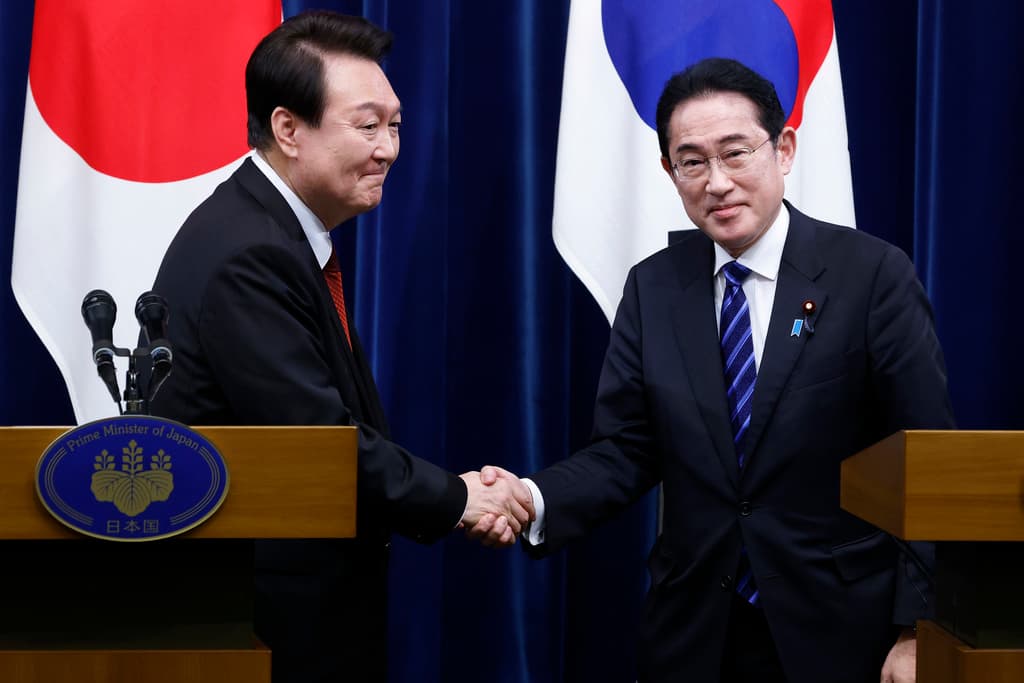Seoul-Tokyo Summit Signals Thaw in Relations, Spurred by Common Threat of Nuclear North Korea
Tokyo, Seoul, and Washington, bound to each other in separate alliances, will stick to demands for North Korea’s denuclearization.

South Korea and Japan will reach another milestone in their often rocky relations when Prime Minister Kishida arrives at Seoul for a summit with President Yoon that will focus on their strategy against North Korea.
A spokesman for Mr. Yoon said the Sunday visit, less than two months after Mr. Yoon met Mr. Kishida at Tokyo, will mark “the full-scale resumption of shuttle diplomacy” after several years of worsening relations. Thirty-five years of Japanese colonial rule precludes a formal alliance between Tokyo and Seoul.
Analysts, though, see the summits as vital for trilateral cooperation with Washington. Tokyo, Seoul, and Washington, bound to each other in separate alliances, will stick to demands for North Korea’s “complete denuclearization.”
With that mutual goal in mind, Messrs. Kishida and Yoon are expected to talk about ongoing joint military exercises involving the naval and air forces of both countries. It’s out of the question, though, that Japanese troops will join Koreans on the ground. “Korea will never accept Japanese troops back on its soil,” a Korean lawyer told the Sun.
“Political and military leaders in Seoul and Tokyo clearly recognize the common threat they face, particularly from North Korea, as well as the need to work together, and in concert with the United States,” a former senior American diplomat in both countries, Evans Revere, said. “Between them,” he said, they’ve “launched a process designed to manage some of the issues that had caused a downturn in relations.”
Beside discussing how to coordinate against North Korea, they will also touch upon the upcoming G-7 summit of leading industrial nations that Mr. Kishida is hosting in Hiroshima, May 19-21. The G-7, in addition to America and Japan, includes Canada, Britain, France, Germany, and Italy. Korea will be a special observer, with Mr. Yoon holding mini-summits with the leaders of all of them.
Looking ahead to the G-7, economic issues, including supply chain resilience, will be high on the agenda in Sunday’s summit. Acutely aware of the need for cooperation with China as well as Russia, they will dance around what they see as obstacles to trade and investment put up by both of them.
Messrs. Yoon and Kishida won’t issue a joint statement such as the “Washington Declaration” that emerged from Mr. Yoon’s summit with President Biden last week at Washington, but they are planning a joint press conference in which they’ll have the chance to affirm their cooperation on a range of issues and their desire to overcome “historical” differences.
One topic will be that of sharing intelligence information that Mr. Yoon’s predecessor, Moon Jae-in, cut off when Japan balked at paying wages to Koreans forced to work for factories in Japan during World War II. Mr. Yoon, during his meeting with Mr. Yoshida in Tokyo, agreed on a deal whereby a foundation would pay the salaries for workers and their families.
That agreement cleared the way for Mr. Yoshida to come to Seoul as the first Japanese prime minister to visit Korea since the late Shinzo Abe attended the opening of the Winter Olympics at Pyeongchang in February 2018. With him in the VIP box were Vice President Pence and the younger sister of the North Korean leader, Kim Yo-jong, as well as North Korea’s nominal head of state, the late Kim Yong-nam.
Japanese prime ministers seem to come to Korea about once a decade. In 2011, the prime minister, Yoshihiko Noda, called on the man who was then Korea’s president, Lee Myung-bak. That was nine years after another Japanese prime minister, Junichiro Koizumi, was the guest of the Korean president, the late Kim Dae-jung. Mr. Koizumi apologized for Japanese rule in a visit to a notorious prison, now a museum, where the Japanese tortured Koreans.
“There’s a lot to be done on the defense and security front, including expanding intelligence cooperation on North Korea, particularly its missile testing program, and engaging in bilateral (and trilateral, with the United States) military exercises,” Mr. Revere said. “The no. 1 priority now is to get the Seoul-Tokyo relationship back on a good track.”
The opposition Minjoo, or Democratic, party, which controls the national assembly, has loudly criticized Mr. Moon for the agreement he reached in Japan on back pay for World War II workers, noting the huge companies where they worked will not have to pay them directly.
Koreans also differ strongly with Japanese on compensation for “comfort women” forced to serve Japanese soldiers during the war. Another contentious issue concerns a pair of enormous rocks in the sea between South Korea and Japan. The Koreans hold the rocky islets, known as Dokdo in Korea. Japan, which calls them Takeshima, refuses to give up its claim.
Messrs. Yoon and Kishida hope, though, to form a common policy on confronting North Korea, which threatens both South Korea and Japan with missiles that often fall in the waters between North Korea and Japan. North Korea has frequently reminded South Korea and Japan that the missiles are capable of carrying tactical nukes aimed at both countries.
Mr. Kishida’s visit will be “the major next step in this process,” Mr. Revere told the Sun. “It will be important for him to ensure that his government maintains the momentum of this reconciliation process.” He must “deal with the lingering concerns of many Koreans that Japan has not sufficiently reciprocated President Yoon’s good will and actions.”
“If he can do this,” Mr. Revere said, “then the prospects for further cooperation will be very good.”

